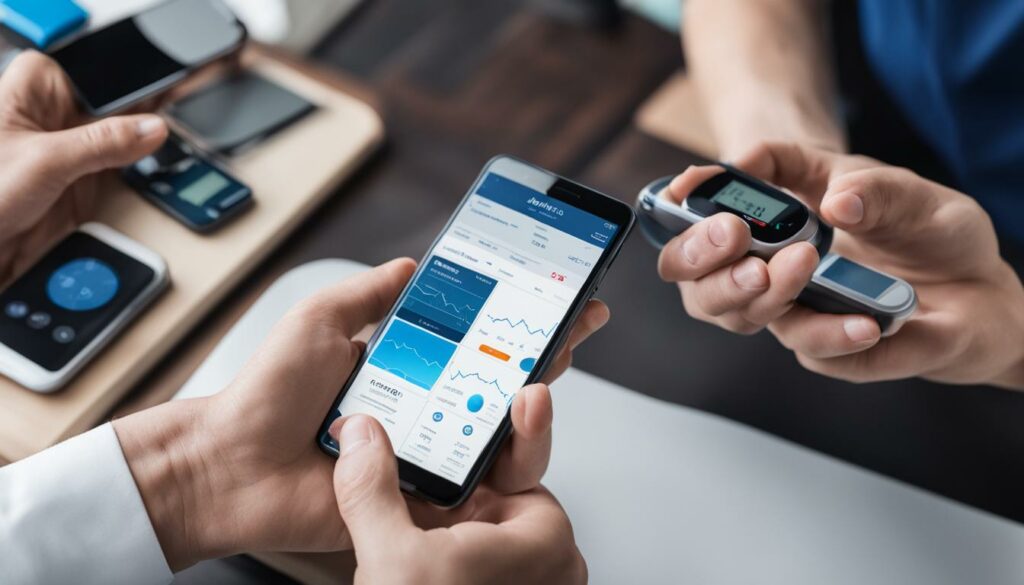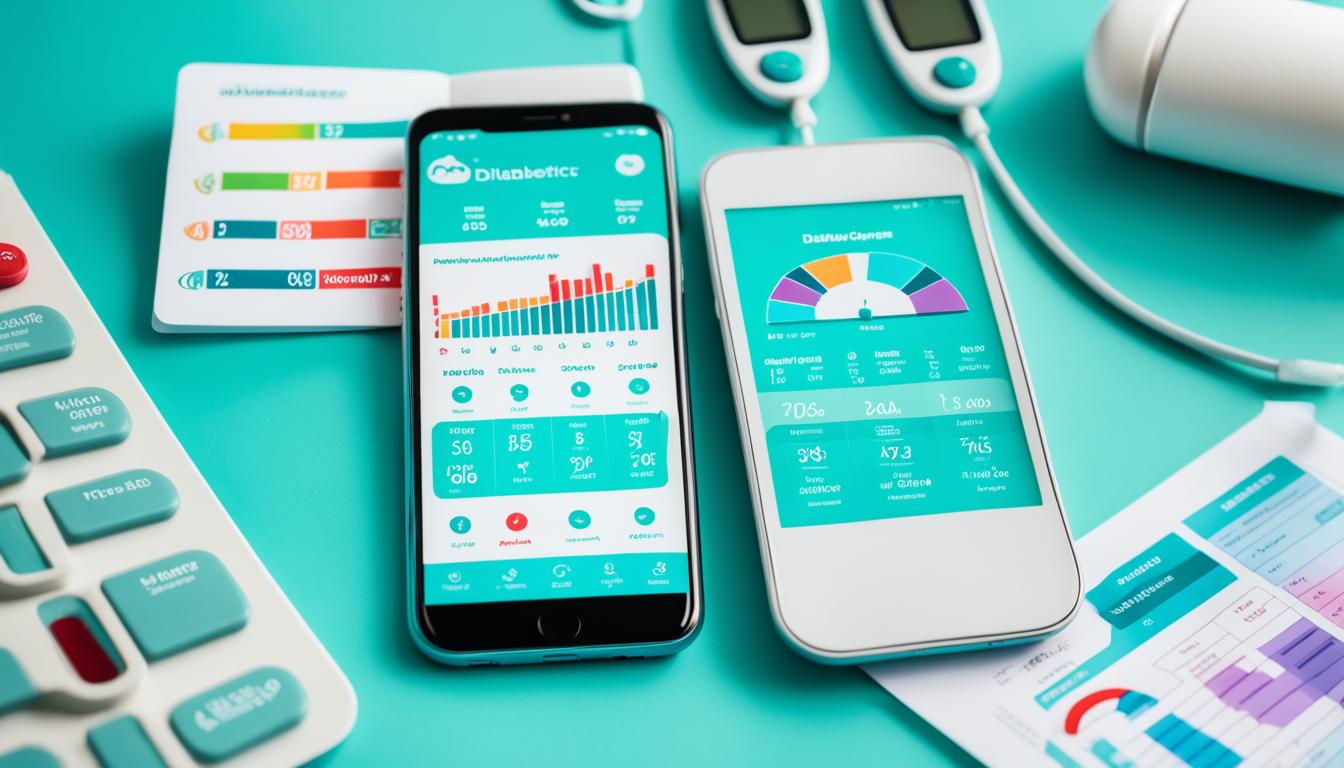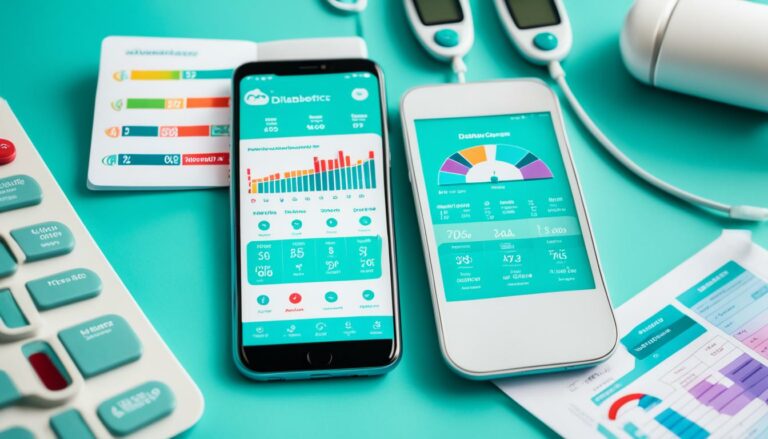Did you know that approximately 34.2 million Americans have diabetes? That’s about 10.5% of the population, making it one of the most prevalent chronic conditions in the country. While managing diabetes can be challenging, advancements in diabetes technology are offering innovative solutions to improve diabetic management and education.
Key Takeaways:
- Technology is transforming diabetes management and education.
- Advancements include glucose monitoring devices, insulin pumps, continuous glucose monitoring systems, and artificial pancreas technology.
- These technologies empower individuals with diabetes to better control their condition and improve their quality of life.
- Digital tools and resources extend diabetes education and support beyond healthcare settings.
- Children and teens with diabetes can benefit greatly from technological tools designed specifically for their needs.
The Impact of Technology on Diabetes Self-Management
Technology has the potential to revolutionize diabetes self-management by providing educational and motivational support. It enables individuals to learn new practices and routines related to diabetes management, such as blood glucose monitoring, exercise, healthy eating, medication adherence, monitoring for complications, and problem-solving.
Studies have shown that technological interventions can have positive impacts on diabetes outcomes, including improvements in hemoglobin A1C levels, self-management behaviors, and self-efficacy. Integrating technology with healthcare providers’ diabetes care can extend the reach of diabetes education and support, particularly for individuals with limited resources or access to care.
Education and Support at Your Fingertips
Smartphones and cell phones have become an integral part of our daily lives, and they can also play a significant role in diabetes self-management. With the help of diabetes-related apps and tools, individuals with type 2 diabetes mellitus can easily monitor their blood glucose levels, track their progress, and receive reminders for medications and healthy lifestyle habits.
These technological advancements allow for real-time data collection, analysis, and customized feedback, empowering individuals to take control of their diabetes management. By having access to personalized information and support at their fingertips, individuals can make informed decisions and stay motivated to achieve their diabetes-related goals.
“Technology is not a replacement for healthcare providers, but it can be a powerful tool to enhance diabetes self-management and improve health outcomes.”
– Dr. Emily Miller, Endocrinologist
The Power of Data-driven Decision Making
By using technology to track and monitor their diabetes management, individuals can gather valuable data that allows them and their healthcare providers to make data-driven decisions about their treatment plans. Continuous glucose monitoring devices can provide individuals with real-time information about their blood glucose levels, helping them identify patterns and make necessary adjustments to their diet, exercise, and medication routines.
Furthermore, smartphone apps and online platforms offer a wealth of educational resources, such as articles, videos, and interactive tools, that can empower individuals to learn more about their condition and make informed decisions. These resources facilitate self-management behaviors and foster greater engagement in diabetes care.
Enhancing Diabetes Outcomes Through Technology
Research has shown that leveraging technology for diabetes self-management can lead to improved diabetes outcomes. A systematic review and meta-analysis of 36 studies found that technology-based interventions significantly reduced hemoglobin A1C levels and improved self-management behaviors and self-efficacy in individuals with type 2 diabetes mellitus.
This positive impact on diabetes outcomes can be attributed to the accessibility, convenience, and personalized nature of technological tools. By integrating technology into diabetes care, healthcare providers can extend their reach and provide tailored support to individuals who have limited resources or face barriers to accessing traditional care.
The Role of Technology in Diabetes Education and Support
Technology plays a critical role in extending diabetes education and support beyond healthcare provider interactions. It allows for individualized care and just-in-time information, especially when primary care resources are insufficient or access to traditional care is limited.
Technological resources include telehealth services, online platforms, and mobile applications that provide patients with access to educational materials, self-management tools, and communication channels with healthcare providers. These resources improve patients’ ability to make informed decisions, enhance self-management behaviors, and foster greater engagement in their diabetes care.
| Technology Resources for Diabetes Education and Support | Benefits |
|---|---|
| Telehealth services |
|
| Online platforms |
|
| Mobile applications |
|
“Technology empowers individuals with diabetes to take control of their condition by providing access to vital resources and support. With telehealth services, online platforms, and mobile applications, patients can receive education, monitor their health, and connect with healthcare professionals from the comfort of their homes.”
Improving Diabetes Outcomes through Technology
Studies have shown that the integration of technology into diabetes education and support has a positive impact on patient outcomes. By utilizing these technological tools, individuals with diabetes can:
- Gain a better understanding of their condition
- Learn effective self-management techniques
- Improve medication adherence
- Enhance glucose monitoring and control
- Stay motivated and engaged in their diabetes care
With continuous access to educational resources, personalized support, and real-time monitoring, patients can make informed decisions and adopt healthier behaviors to manage their diabetes effectively.

Technological Tools for Diabetes Management in Children and Teens
Technological tools play a crucial role in managing diabetes in children and teens, providing them with support, education, and empowerment in a format that feels familiar to them. Specifically designed games and apps cater to this young population, offering interactive experiences that teach important concepts related to diabetes management, such as understanding glucose levels, managing insulin, and making healthy food choices.
These games and apps not only educate children and teens about their condition but also create an engaging and motivating environment for them to actively participate in their own diabetes management. By leveraging the power of gamification, young individuals with diabetes can learn important skills while having fun.
“The use of games and apps designed for diabetes management in children and teens is transformative. It allows them to develop a deep understanding of their condition in an enjoyable and interactive way.”
– Dr. Emily Thompson, Pediatric Endocrinologist
In addition to games and apps, the development of artificial intelligence (AI) tools has further expanded the possibilities for diabetes management in young individuals. These AI-driven tools provide personalized guidance and support, helping children and teens make informed decisions about their diabetes care.
Benefits of Technological Tools for Diabetes Management in Children and Teens
The utilization of technological tools in diabetes management for children and teens has demonstrated numerous benefits:
- Improved understanding of diabetes and its management
- Enhanced engagement in diabetes self-care
- Increased empowerment and independence
- Encouragement of healthy habits and lifestyle choices
- Promotion of better health outcomes
| Benefit | Impact |
|---|---|
| Improved understanding of diabetes and its management | Enables children and teens to take control of their condition, resulting in better adherence to treatment plans |
| Enhanced engagement in diabetes self-care | Encourages active participation and responsibility in managing diabetes, leading to improved self-management behaviors |
| Increased empowerment and independence | Empowers children and teens to make informed decisions about their diabetes care, fostering a sense of confidence and self-reliance |
| Encouragement of healthy habits and lifestyle choices | Promotes the adoption of healthy eating, regular exercise, and overall well-being, reducing the risk of complications |
| Promotion of better health outcomes | Leads to improved glycemic control, reduced hospitalizations, and better long-term health outcomes |
Overall, the integration of games, apps, and artificial intelligence tools in diabetes management for children and teens revolutionizes how they understand and control their condition. These technological advancements have the potential to shape a brighter future for young individuals with diabetes, empowering them to live healthy and fulfilling lives.
Diabetes Technology Wrap Up
Technology is revolutionizing the management and education of diabetes, paving the way for better health outcomes and enhanced quality of life. With the advancements in glucose monitoring devices, insulin pumps, continuous glucose monitoring systems, and the potential of artificial pancreas technology, individuals with diabetes now have powerful tools at their disposal to track and control their condition more effectively.
In addition to monitoring devices, technology plays a crucial role in diabetes self-management, offering educational and motivational support. By leveraging technology, individuals with diabetes can learn about important practices like blood glucose monitoring, exercise, healthy eating, medication adherence, and monitoring for complications. Studies have shown that these interventions can lead to improved diabetes outcomes such as lower hemoglobin A1C levels and better self-management behaviors.
Moreover, technology extends the reach of diabetes education and support beyond traditional healthcare settings. Telehealth services, online platforms, and mobile applications provide patients with valuable resources, including educational materials, self-management tools, and channels for direct communication with healthcare providers. This accessibility enhances patients’ ability to make informed decisions, adopt self-care behaviors, and actively engage in their diabetes care.
As the diabetes technology market continues to evolve, we can anticipate even more exciting innovations that will further enhance the lives of individuals with diabetes. These advancements will not only improve the management of diabetes but also contribute to the overall well-being of those living with this condition. The future holds tremendous promise for diabetes technology, empowering individuals to live healthier, happier lives.
FAQ
What is diabetes technology?
Diabetes technology refers to tools and devices that help individuals with diabetes manage their condition. These tools include glucose monitoring devices, insulin pumps, continuous glucose monitoring systems, and artificial pancreas technology.
How does technology improve diabetes management?
Technology improves diabetes management by providing educational and motivational support. It helps individuals learn new practices and routines related to diabetes management, such as blood glucose monitoring, exercise, healthy eating, and medication adherence.
What are the benefits of incorporating technology in diabetes care?
Incorporating technology in diabetes care extends education and support beyond healthcare provider interactions. It allows for individualized care, just-in-time information, and access to educational materials, self-management tools, and communication channels with healthcare providers.
How do technological tools benefit children and teens with diabetes?
Technological tools provide support and education in a familiar format for children and teens with diabetes. Games and apps designed for this population help them understand and manage their condition by teaching them about glucose levels, insulin management, and making healthy food choices.
What can we expect from the future of diabetes technology?
The diabetes technology market is constantly evolving with new innovations. We can expect even more exciting breakthroughs that will further enhance the lives of individuals with diabetes, improving their management and overall well-being.
Find Travel Nursing Jobs




